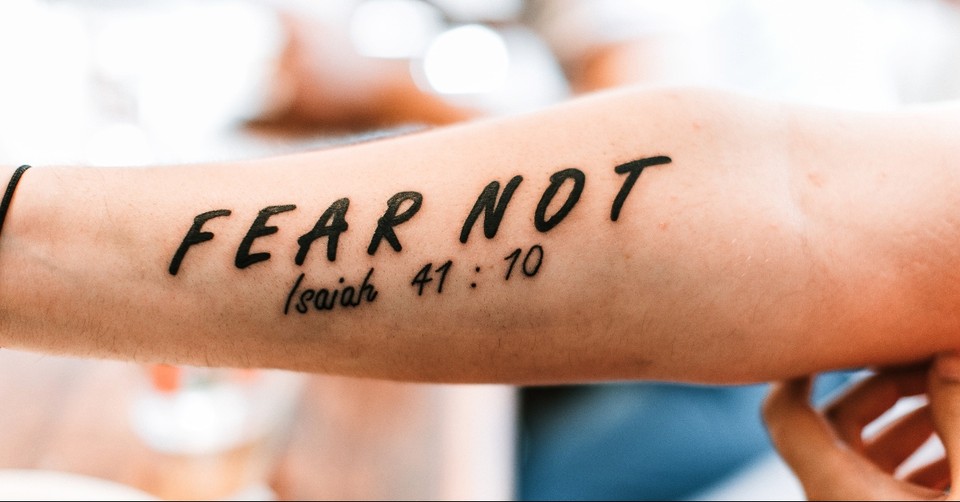Can We Go to Heaven with Tattoos?

Have you wondered if tattoos would disqualify you from entering heaven? In today’s culture, tattoos have become very popular, even in the church. It seems all the cool kids have them.
Yet, tattoos were once considered taboo, at least in the Christian world. I remember the day when tattoos were reserved for sailors and Hell’s Angels. They were associated with gangs and criminals. Usually, scary people had tattoos. But inked words and pictures are now found on preachers, athletes, lawyers, and stay-at-home moms. They’re no longer a negative sign, which makes us wonder why they ever were.
Does the Bible Ever Forbid Getting a Tattoo?
Many Christians have used Scripture as the reason to abstain from getting a tattoo. In Leviticus 19:28, God forbids cutting and marking your body. “‘Do not cut your bodies for the dead or put tattoo marks on yourselves. I am the Lord.”
That’s clear and straightforward. But no verse in the Bible should be read in a vacuum. The context of the Scripture and the entire counsel of the Word must be examined to understand this command better and its role in our lives today. Does this apply to the twenty-first-century Christian?
First, let’s look at the context of Leviticus 19:28. Keep in mind the culture of the time and the reason for the laws in Leviticus. God was setting His people apart from all other cultures. The laws of Leviticus covered religious, criminal, and civil law. These were instructions for living Holy, set-apart lives.
So, when God forbid cutting your body for the dead or putting marks on yourselves, He was saying, “Worship me alone.” The cutting for the dead was a ritual performed by the followers of Baal. According to the NIV Cultural Backgrounds Bible, “An Akkadian text from Ugarit describes persons who lacerate themselves on behalf of a dying righteous person.” This same commentary explains the markings as those found on Egyptian mummies that either signified the god that the person worshipped or the deity he claimed to be. In Mesopotamia, most tattoos were slave markings, but some were also on priests identifying the god they worshipped.
Based on the period and the cultural context, tattoos were forbidden because people used them as a form of worship representing the pagan god they served or as who they belonged to as a slave. God alone was to be worshipped, and He had freed His people from slavery.
Does the Bible Ever Show People Getting Tattoos to Serve God?
Though the verse in Leviticus explicitly denies God-followers to mark themselves, other scriptures paint a different picture. As stated above, the entire counsel of God’s Word must always be considered before making a judgment. So, let’s look at an interesting verse regarding Israel’s worship.
Isaiah 44 is a beautiful chapter of God’s covenantal promise to Israel. Isaiah writes of the children of Jacob, defining their worship of YHWH. In her article “Why Does the Bible Forbid Tattoos?” Liva Gershon explains that this Scripture appears to allow tattoos as a sign of submission to God.
Some will say, ‘I belong to the Lord’;
others will call themselves by the name of Jacob;
still others will write on their hand, ‘The LORD’s,’
and will take the name Israel. (Isaiah 44:5)
They wrote “LORD” on their hands. Anytime the word Lord is in all caps, it signifies the covenant name of God. It seems some did take on the practice of marking themselves for YHWH, claiming who they belonged to and worshiped.
Why Have Christians Often Seen Tattoos as Sinful?
Christians have seen tattoos as sinful because of God’s strict enforcement in Deuteronomy regarding the practice. They’ve also seen it as sinful because scriptures remind us to be in the world but not of the world—a phrase taken from Jesus’s prayer in John 17. This could connect back to the warning in Deuteronomy when God taught the Israelites how to set themselves apart from other cultures.
God calls us to be different. To be holy. To be sanctified. Paul encouraged the Corinthians to remember that their bodies were the Temple of the Holy Spirit and to honor God with their bodies (1 Corinthians 6:19-20). This Scripture refers to sexual immorality, but the precept to honor our bodies can be understood in many areas of our lives, including what we put on them. To some Christians, tattoos do not honor God because they alter God’s creation.
Will There Be Tattoos in Heaven?
Maybe grace does change the narrative. And maybe those Christians who look down on tatted preachers and worship leaders will be surprised when they see tattoos in heaven. We will not take our tats with us as we enter His Presence. Scripture promises new, glorious bodies, but Revelation 19:16 describes Jesus with the title “King of Kings and LORD of LORDS” written on His thigh. And Revelation 22 proclaims that the Lamb’s servants will see His face, and His name will be on their foreheads. This is what John saw in his vision. Whether it is symbolic rather than literal, we won’t know until that day comes.
Regardless, these verses again reveal that the purpose of ink on a believer’s skin is to glorify the One we worship.
What Are Some Good Questions to Ask Before We Get Tattoos?
If you haven’t joined the inked movement yet, here are some questions to ask before you put something on your body that you can’t remove.
- Why do I want a tattoo?
- What tattoo would glorify Jesus?
- What’s the pain level? Do I want to be in pain? Are there other ways I can glorify God?
- How much does it cost? You need to rethink this financial investment if you can’t pay your rent or cell phone bill. Tattoos are not free.
- Ask for a scripture and confirmation from the Lord regarding this big step.
Prayers for Those Wanting a Tattoo
As a Christian, our motive for getting the tattoo is everything. Paul wrote that everything is permissible, but not everything is helpful. Ask yourself why you want it. If it’s just because it’s cool, maybe that’s not the best reason. If it will possibly help someone else come to Christ, maybe it’s a good thing to do.
A great prayer to pray when discerning your motives is in the last verses of Psalm 139. David cried to the Lord to search his heart. He prayed, “See if there is any offensive way in me and lead me to the way everlasting” (Psalm 139:24). The word “offensive” in Hebrew means “idolatrous.” Make sure your tattoo is not an idol—a sign of worshipping the culture rather than Jesus.
Chances are, if you found this article, you were searching for an answer. You want to get a tattoo but aren’t sure about it. If that is you, let’s pray together about this decision.
“God of heaven, we love you. We want to serve you with our lives, including what we put on our bodies. Thank you for Jesus and the new covenant of grace. Thank you for the freedom to worship you in creative ways. Search our hearts, Lord. Know our worries about this decision. If it is idolatrous, make that clear, but if a tattoo will bring you glory and open doors for conversations with those who don’t know you, give peace and confirmation. Thank you, Lord. In Jesus’s name, we pray. Amen.”
Photo Credit: Photo Credit: ©Unsplash/jhc
Andy Lee is an event speaker, blogger, YouTuber, and award winning author of three books, A Mary Like Me; The Book of Ruth Key-Word Bible Study, and Radiant Influence: How an ordinary girl changed the world. She passionately teaches how to find life in God's Word in order to live abundantly. You can catch her life giving messages weekly on Instagram and YouTube. She also provides monthly Bible reading plans and articles on her website www.wordsbyandylee.
Originally published December 13, 2023.







